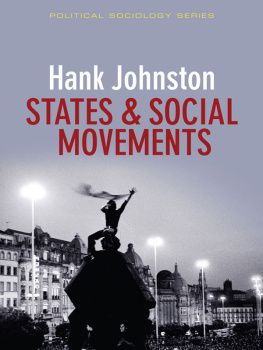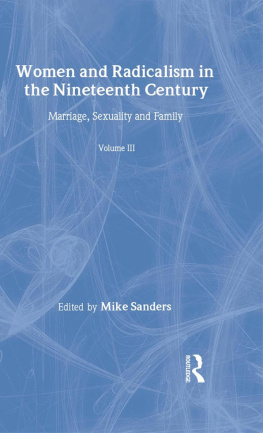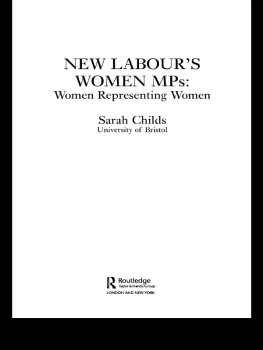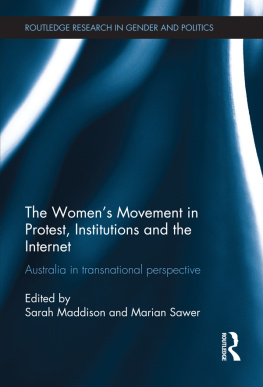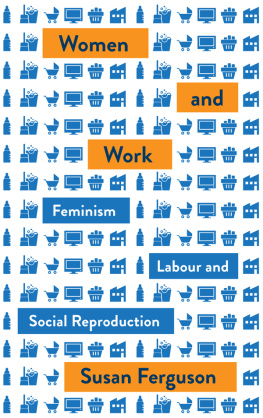ROUTLEDGE LIBRARY EDITIONS:
WOMEN'S HISTORY
WOMEN IN PROTEST 1800-1850
WOMEN IN PROTEST 1800-1850
MALCOLM I. THOMIS AND JENNIFER GRIMMETT
Volume 37
First published in 1982
This edition first published in 2013
by Routledge
2 Park Square, Milton Park, Abingdon, Oxfordshire OX14 4RN
Simultaneously published in the USA and Canada
by Routledge
711 Third Avenue, New York, NY 10017
First issued in paperback 2014
Routledge is an imprint of the Taylor & Francis Group, an informa business
1982 Malcolm I. Thomis and Jennifer Grimmett
All rights reserved. No part of this book may be reprinted or reproduced or utilised in any form or by any electronic, mechanical, or other means, now known or hereafter invented, including photocopying and recording, or in any information storage or retrieval system, without permission in writing from the publishers.
Trademark notice: Product or corporate names may be trademarks or registered trademarks, and are used only for identification and explanation without intent to infringe.
British Library Cataloguing in Publication Data
A catalogue record for this book is available from the British Library
ISBN: 978-0-415-62820-4 (Volume 37)
ISBN: 978-1-138-00813-7 (pbk)
Publisher's Note
The publisher has gone to great lengths to ensure the quality of this reprint but points out that some imperfections in the original copies may be apparent.
Disclaimer
The publisher has made every effort to trace copyright holders and would welcome correspondence from those they have been unable to trace.
Women in Protest 1800-1850
MALCOLM I. THOMIS AND JENNIFER GRIMMETT
1982 Malcolm I. Thomis and Jennifer Grimmett Croom Helm Ltd, 2- 10 St John's Road, London SW11
British Library Cataloguing in Publication Data
Thomis, Malcolm I.
Women in Protest 1800- 1850.
1. Social movements Great Britain History
2. Women Great Britain History
I. Title II. Grimmett, Jennifer
303.6'0941 HN49.W6
ISBN 0-7099-2407-0
Phototypesetting by Pat Murphy
296b Lymington Road, Highcliffe-on-Sea, Dorset
Printed and bound in Great Britain
by Billing and Sons Limited
Guildford, London, Oxford, Worcester
We should like to thank two colleagues from the University of Queensland History Department, Mavis Little, who typed the manuscript, and Mary Kooyman, who helped us to assemble and check material.
For Josephine, already a woman in protest
Women have never held such professional interest for historians as they have in recent years. Since history was first written men have almost monopolised the attention of historians, and this has inevitably left many gaps to be filled and certain sensitivities amongst those whose predecessors have been so badly neglected. It is not the purpose of this text to help to correct the injustices that have been perpetrated by historians and others over the centuries; nor is it the intention to create some theoretical framework within which aspects of women's history can be studied. Its main purpose is simply to suggest that in the area of social and political protest women of nineteenth-century Britain might well have had a significant role that has not yet been fully described and explained; if this is so, then here is a matter worthy of investigation. Full descriptions, let alone full explanations, are still premature, for reasons which will be explained, but partial ones should at least facilitate the task of those who will eventually impose order and meaning upon this little-known subject.
It is possible that most prominent writers on the question of social protest have not said as much about women as their role warrants. If an incomplete account of the past has resulted this is to be regretted, for its own sake and not primarily because it has done an injustice to women. If historians who have looked at this issue are to be criticised for their deficiencies, these must be identified in terms of conclusions which do not follow from the evidence they have examined or of the incompleteness of their evidence; they must not be condemned because women have emerged from their writings with less glory than some people suppose is their due.
The two leading historians of British social protest, George Rude and Edward Thompson, are both vulnerable to criticism for their treatment of the role of women. Rude's recent work on 'Protest and Punishment' suggests that out of 3,600 social protest.
Edward Thompson, on his own claim the attempted rescuer of failed minorities (who, by no stretch of the imagination, could be said to include women) from the condescension of posterity, has been berated for treating 'female radicalism with untypical circum spection' and ascribing to women the role of moral supporters of their more active men. Perhaps the offence of commission there was greater than the earlier one of omission, for it helped to reinforce the image of the stereotype, concerned with matters domestic, especially food prices, and placed women firmly in the market-place, if not exactly beside the kitchen sink. There is evidently a greatly felt need to establish that women's presence in the market-place concerned pamphlets and politics as well as prices, and a more complete account is now being sought.
Setting the limits of an enquiry is not easy, especially with a topic such as social protest, which some would wish to embrace all forms of crime that arise from the failure of society to make proper provision for its members. This study is not concerned with acts of personal gain but with collective action, peaceful and violent, for the achievement of social and political ends carried out usually within what are known as 'popular movements'. Protest will be interpreted broadly to include those actions, often crimes in the law of the times, to change the status quo in politics and in industry; although such movements as parliamentary reform and trade unionism were later to become the epitome of constitutional behaviour, they originated none the less in discontent and protest in the period under consideration.
Any attempt to establish the significance of women's role in popular protest must beware of fulfilling its own prophecy that there is a particular role to be identified. It has been suggested, for instance, that whilst their part can be described and even given an emphasis that has previously been lacking, it would be a mistake to suppose that theirs was different and separate from that of males in protest. Their activity, it is said, went well beyond the familiar issue of bread rioting and into matters of greater political content, in the same way that male protest extended over a wide range of subjects and for much the same reasons. whether the vision changed as well as the tactics.
The part of it that remained fairly constant was the continued readiness of most women to see politics as a man's world. When women mobilised support for Chartism, they did so, it has been suggested, in support of working-class interests rather than to raise questions related to women,


